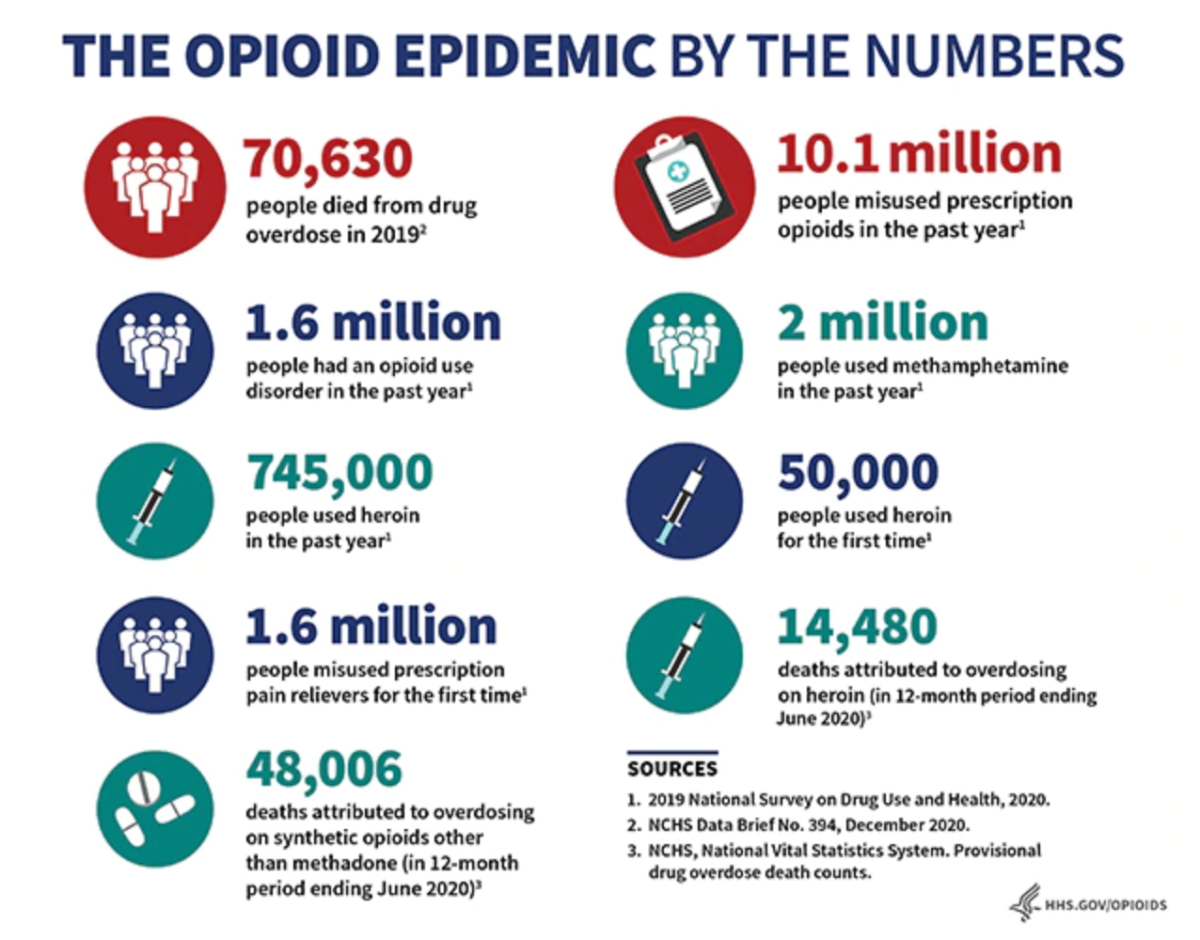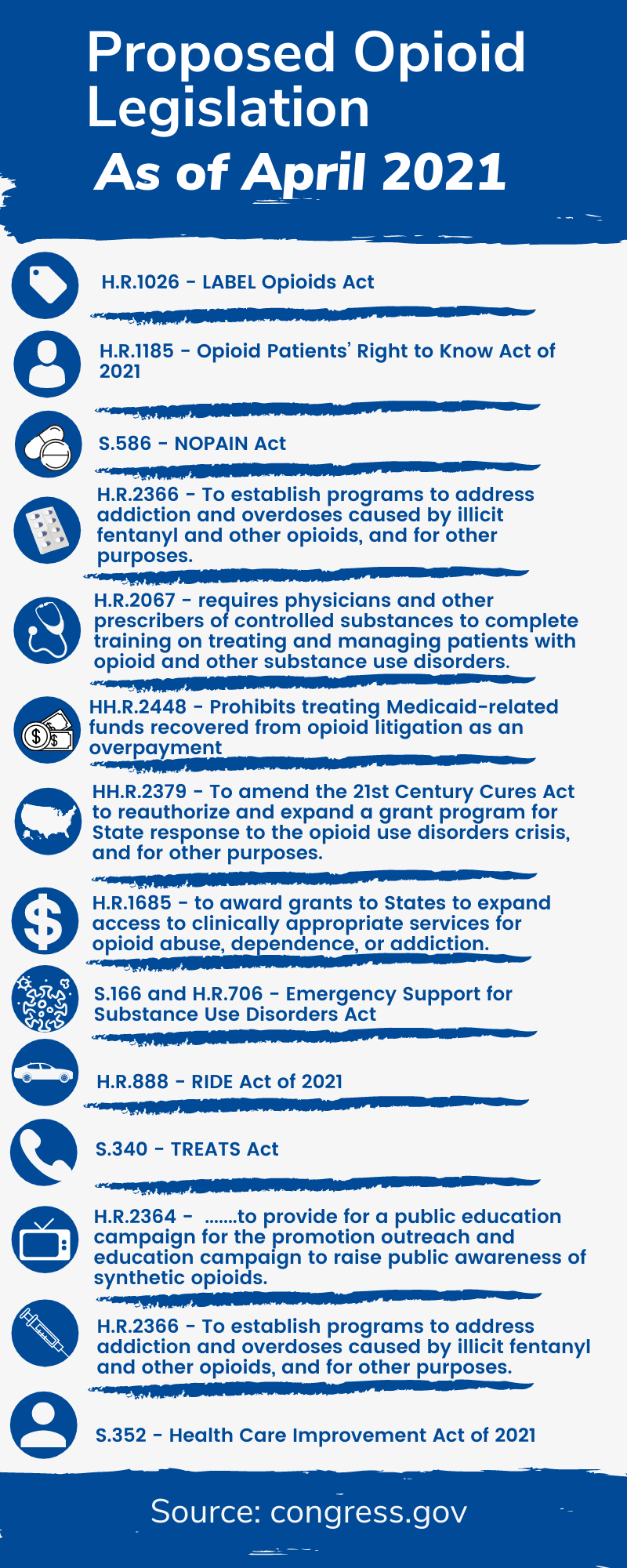
Proposed Legislation to Tackle the Opioid Epidemic
By Charlotte Spencer
Years into the opioid epidemic, Congress is still working to find solutions that help society address this issue. This year several laws have been proposed already. They include laws focused on warning labels, patient education, healthcare worker education, healthcare marketplace navigator education, alternative treatment options, telehealth, marketing campaigns, grants to states, and grants to community organizations. Here is an overview of the bills to combat the opioid epidemic introduced so far this year.
H.R.1026 – LABEL Opioids Act
This would amend 21 U.S.C. 825 to require a warning label on opioids that states that the opioids or opiates dispensed can cause dependence, addiction, and overdose. It would also require a label on all schedule II, III, and IV drugs, including opioids, stating that it is a crime to transfer the drug to any person other than the patient. This bill has bipartisan support.
H.R.1185 – Opioid Patients’ Right to Know Act of 2021
This would create a grant program to help educate patients about the risks of opioids, and their analogues. Grants would be up to $1 Million each and would go to states. This bill has bipartisan support.
S.586 – NOPAIN Act
The long title of this bill is “A bill to amend title XVIII of the Social Security Act to combat the opioid crisis by promoting access to non-opioid treatments in the hospital outpatient setting.” This bill has bipartisan support, and would amend current law to promote alternatives to opioid treatment for applicable patients.
H.R.2067 – To amend the Controlled Substances Act to require physicians and other prescribers of controlled substances to complete training on treating and managing patients with opioid and other substance use disorders, and for other purposes.
This bill with bipartisan support would amend current law to require doctors, and any others with the power to prescribe medication, such as nurse practitioners, to complete training on treating and managing patients with substance use disorders.
H.R.1685 – To authorize the Assistant Secretary for Mental Health and Substance Use, acting through the Director of the Center for Substance Abuse Treatment, to award grants to States to expand access to clinically appropriate services for opioid abuse, dependence, or addiction.
If made law this would help get money to states in need of more resources to address opioid abuse, dependence, and addiction.
S.166 and H.R.706 – Emergency Support for Substance Use Disorders Act
If made law these would create a grant program to help combat the harms of drug misuse. Grants would go to States, Tribes, and community organizations to support the delivery of overdose prevention, syringe services programs, and other harm reduction services that address the harms of drug misuse during the COVID–19 pandemic. Money could be spent on education, counseling, naloxone, and harm reduction services. Both have bipartisan support.
H.R.888 – RIDE Act of 2021
This bill addresses the issue of drugged driving. If made law it would create a drugged driving pilot program to study the effects of public marketing campaigns to prevent drugged driving, and eventually require a report to Congress after sufficient time to conduct a study.
S.340 – TREATS Act
If made law this would amend title XVIII of the Social Security Act to increase the use of telehealth for substance use disorder treatment and mental health services.
S.352 – Health Care Improvement Act of 2021
This would amend the Patient Protection and Affordable Care Act to reduce health care costs and expand health care coverage to more Americans. Although it is not focused on the opioid epidemic, it does address the opioid epidemic. It would require that navigators receive opioid specific education and training that ensures the navigator can best educate individuals on qualified health plans offered through an Exchange, specifically coverage under such plans for opioid health care treatment. Navigators are individuals or organizations that help consumers as they look for health coverage options through the healthcare.gov marketplace.
H.R.2364 – To amend title III of the Public Health Service Act to direct the Secretary, acting through the Director of the Centers for Disease Control and Prevention, to provide for a public education campaign for the promotion outreach and education campaign to raise public awareness of synthetic opioids.
This bill has been referred to the Committee on Energy and Commerce. If made law this would require a public education campaign specifically focused on the dangers of synthetic opioids.
H.R.2366 – To establish programs to address addiction and overdoses caused by illicit fentanyl and other opioids, and for other purposes.
This bill has been referred to the Committee on Energy and Commerce, and to the Committee on the Judiciary. As the title suggests, it would create programs to combat opioid addiction and overdose.
H.R.2379 – To amend the 21st Century Cures Act to reauthorize and expand a grant program for State response to the opioid use disorders crisis, and for other purposes.
This bill has bipartisan support. It would assist with funding state responses to the opioid epidemic.
H.R.2448 – To amend title XIX of the Social Security Act to prohibit the Secretary of Health and Human Services from treating any Medicaid-related funds recovered from one or more pharmaceutical companies or drug distributors with respect to opioid litigation as an overpayment under such title, and for other purposes.
This bill has bipartisan support. It deals with the issue of what to do with medicaid money recovered from pharmaceutical companies and drug distributors through opioid litigation. This is increasingly an issue as prosecutors continue to go after those who contributed to the opioid epidemic.
This article is part of a larger series of articles that Biometrica will be doing to look in depth at the public safety implications of the opioid epidemic. Follow us for more on this topic.

The writer is a lawyer and a coder, and a member of the Arizona bar.
If you have feedback on this article, please write to us at marketing@biometrica.com.